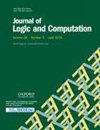具有拓扑限制的集体论证:聚合抽象论证框架的案例
IF 0.7
4区 数学
Q3 COMPUTER SCIENCE, THEORY & METHODS
引用次数: 0
摘要
集体辩论是在辩论中达成集体决定的过程,这个决定是团队可以接受的。为了丰富集体论证的研究,我们引入了拓扑约束的概念。拓扑约束是假定个体主体能够满足的理性约束。我们假设在一场辩论中,对于所考虑的每一对论点,每个智能体都表明第一个论点是否攻击第二个论点,即一个智能体的论证立场被表征为一个论证框架,并且只允许满足拓扑限制的论证框架。本文考虑的拓扑限制包括文献中的各种拓扑性质,如非环性、对称性、相干性和确定性,以及概括经典社会选择理论领域条件的三种拓扑限制。研究表明,当智能体提供的论证框架轮廓满足拓扑限制时,可以避免聚合过程中的不可能结果。此外,如果概要文件在拓扑上受到一般化域条件的限制,那么多数规则在聚合期间保留了几个理想的属性。本文章由计算机程序翻译,如有差异,请以英文原文为准。
Collective argumentation with topological restrictions: the case of aggregating abstract argumentation frameworks
Collective argumentation is the process of reaching a collective decision that is acceptable to the group in a debate. We introduce the notion of topological restriction to enrich the study of collective argumentation. Topological restrictions are rational constraints assumed to be satisfied by individual agents. We assume that in a debate, for every pair of arguments under consideration, every agent indicates whether the first argument attacks the second, i.e. an agent's argumentative stance is characterized as an argumentation framework, and only argumentation frameworks that satisfy topological restrictions are allowed. The topological restrictions we consider in this paper include various topological properties in the literature, such as acyclicity, symmetry, coherence and determinedness, as well as three topological restrictions that generalize classic social-choice-theoretic domain conditions. We show that when the profile of the argumentation frameworks provided by the agents satisfies topological restrictions, impossibility results during aggregation can be avoided. Furthermore, if a profile is topologically restricted with respect to restrictions that generalize domain conditions, then the majority rule preserves several desirable properties during aggregation.
求助全文
通过发布文献求助,成功后即可免费获取论文全文。
去求助
来源期刊

Journal of Logic and Computation
工程技术-计算机:理论方法
CiteScore
1.90
自引率
14.30%
发文量
82
审稿时长
6-12 weeks
期刊介绍:
Logic has found application in virtually all aspects of Information Technology, from software engineering and hardware to programming and artificial intelligence. Indeed, logic, artificial intelligence and theoretical computing are influencing each other to the extent that a new interdisciplinary area of Logic and Computation is emerging.
The Journal of Logic and Computation aims to promote the growth of logic and computing, including, among others, the following areas of interest: Logical Systems, such as classical and non-classical logic, constructive logic, categorical logic, modal logic, type theory, feasible maths.... Logical issues in logic programming, knowledge-based systems and automated reasoning; logical issues in knowledge representation, such as non-monotonic reasoning and systems of knowledge and belief; logics and semantics of programming; specification and verification of programs and systems; applications of logic in hardware and VLSI, natural language, concurrent computation, planning, and databases. The bulk of the content is technical scientific papers, although letters, reviews, and discussions, as well as relevant conference reviews, are included.
 求助内容:
求助内容: 应助结果提醒方式:
应助结果提醒方式:


